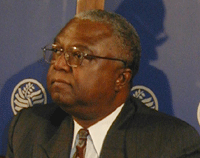 |
|
Dr. Amos Sawyer
|
Dr. Sawyer said that Liberia is still at war with itself, noting, that the war that is constantly highlighted in the press is the "shooting war" between the Taylor regime and LURD, but there are "numerous non-shooting wars that are just as potent politically". He pointed to what he called the "layers of historical hatred and feud" that divide the Liberian people. This, according to him, is to Taylor's advantage. He is now "galvanizing" and "manipulating" the animus in the strategy for domination and control.
On security, Dr. Sawyer said the security of Liberia is linked to that of the West African sub-region and as such, it must be of international concern. To Dr. Sawyer, the deployment of a stabilization force is the way forward. Commenting further, Dr. Sawyer said the Sierra Leone War Crimes Tribunal has provided Liberians an excellent opportunity for Mr. Taylor's indictment and subsequent trial. "Liberia has become an explosive device within the sub-region. The fuse of that device needs to be removed as we try to dismantle that explosive device. And I think that should be the task for Liberians and the international community at this point..." Dr. Sawyer stated.
The Former Interim President of Liberia also called for the formation of an interim government, but quickly ruled out himself as the leader for the interim mechanism. He opined that the arrangement would help Liberians in sorting "out an agenda."
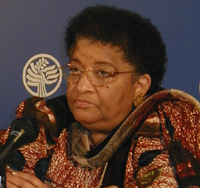 |
|
Ellen Johnson-Sirleaf
|
Mrs. Johnson-Sirleaf recently paid a one-week visit to Liberia. She summarized the prevailing conditions in Liberia under Mr. Taylor as follows:
"A little over five years since elections, that brought the current government into power and after seven years of a civil war, today the country still has no electricity, no running water even in the nation's capital. Many schools have not been reopened and those that are opened have very few supplies and materials. Teachers, fighting to do a good job, who have not been paid for several months clearly cannot perform their duties. The same applies to hospitals, clinics, and medical services. Both economic and social infrastructure have so deteriorated that they are non functional and the process of this institutionalization has reached such a level that it has ensured that the bigman rule is all that governs the entire country. This one man rule is built upon the dual system of patronage, and intimidation.
"I tried to get some statistics on the performance of the economy and went to the usual sources: World Development Report, Human Development report - (nonexistent) because, Liberia is no longer covered by those instruments since it means national account reporting has long ago stopped.
"But we were fortunate that the Washington Post carried some basic statistics in an advertisement supplement that the government paid (this is serious) over $310,000.00 in a country where 50% of the population is either in refugee camps in neighboring counties or internally displaced. According to these statistics, the GDP for 2000 was $463 million..., per capita income - $141.00 [in] a country that was a middle- income country, called a blend country by World Bank standards in the early eighties. Public debt (again according to government's statistics): three billion, 2.6 of which - external. And with all of this, the budget for 2002/2003 is 70 million [dollars]. Seventy million compared (in the early 1980's) to 500 million.
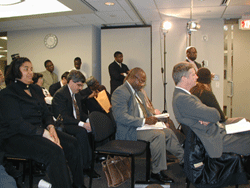 |
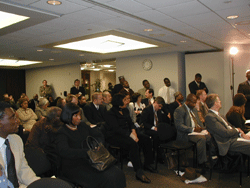 |
|
Audience at the forum
|
"The company that operates these logs not only had administrative heads of counties in jail for raising the concerns about the lack of services, the lack of benefits... And the company operates an army - very well armed. We have the question of maritime revenue - another major source, long historical means of resources for the country... I only urge people to read the UN Security Council report that details the misallocation of the country's resources that leave the people today with hardly food to eat...
"Over this canopy of poverty of impoverishment to which the people have been subjected, reign a small political elite class... living a lavish lifestyle characterized by conspicuous consumption. They don't have to worry that there is no light and water because they have homes that have long large walls, they have homes that have their own electricity generators, their own water supplies have been built..."
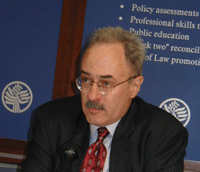 |
|
Mr. Mark Bellamy
|
"This is a regime whose attributes more closely resemble often times those of a gang than a government and this is a leader whose behavior more closely akin to that of a gang leader than that of a president.
Though Liberia maybe a failed state, that has not prevented it from being an important predatory actor in the region - a predatory state. Liberia remains the continued source of conflict and instability in the region. In fact, this is a regime that thrives on conditions of lawlessness and governmental breakdown, not only in Liberia itself but [also] in neighboring states. The war in Sierra Leone is only the most obvious example of this. The war in Sierra Leone generated for several years important benefits, important revenue flows for Liberia. Liberia's effort, the Taylor regime's effort to extend the conflict to Guinea in the year 2000 was part of this same phenomenon.
"Ultimately, this is a bid to displace weak governing institutions, a weak governing authority in areas of Guinea and to generate new revenue flows for the regime. If there is any good news out of the region over the past year or eighteen months, I think it is in the fact that the predatory nature of the regime in Liberia has been contained to a certain extent. Contained for a number of reasons: first of all, through concerted diplomatic actions, United States played a role in that, but more importantly it was the states of West Africa (ECOWAS) who played a leading role in drawing a line of what was acceptable and unacceptable and eventually throwing their support behind UN sanctions on Liberia... Those sanctions have had... psychological impact on the government in Monrovia and have cut into the regime's ability to generate instability in the region... Alongside this, of course, has been the success of the UN Peace keeping operation in Sierra Leone backed by a very capable and determined British military presence.
So, the combination of these factors has at least temporarily closed off avenues for predatory activities by the Liberian government, and has had the effect of constraining their ability to make misery in the region. That said, we know that there are still a number of fighters, un-reconciled RUF forces from Sierra Leone who have taken refuge in Liberia, some of whom have been integrated into the Liberian armed forces. They represent still an important future source of instability, and Liberia, despite the UN ban, is continuing to receive weaponry and re-supply from abroad
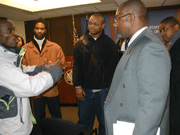 |
|
A group of Liberians confronting LURD's Joe Wylie (Right) at the end of the forum
|
The US diplomat wants the UN sanctions regime on Liberia, which is slated for review in May of 2003 to be extended.
"We simply must maintain the pressure on Liberia. The sanctions come up for renewal at the UN in May - there will be an effort on the part of some members, probably, in the Security Council that now the war in Sierra Leone is over and the rationale for sanctions no longer exists. It will be a real mistake to relax sanctions precisely at the time when they are beginning to produce results. So, first and foremost, we will argue [at the UN] that it is important to maintain the sanctions pressure on the Taylor regime.
"It is important to do everything we can to enable and empower the democratic opposition in Liberia itself. It is crucial that the opposition, which has been brutalized by the government and fragmented, be given every opportunity to pull itself together and to begin to operate effectively in Liberia. While we cannot substitute for the action that has to be taken by the Liberian democratic opposition forces, we can do more to enable them to operate."